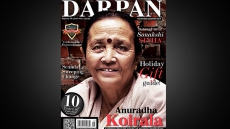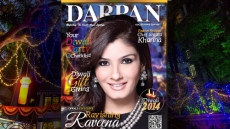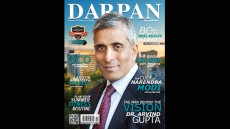The sitar virtuoso is one of the most recognized and exciting voices in world music today. Anoushka Shankar’s music beautifully blends her legendary father’s teachings of the deep Indian tradition with her own contemporary voice to create deep sensual tracks.
Being the youngest daughter of a man hailed as the godfather of world music and who also introduced the cultural riches of the East to the West, the world may have handed Anoushka Shankar the baggage of carrying Ravi Shankar’s legacy forward; however that has not prevented her from conceiving her own depths in this classical music form. She has successfully cemented her name not only as the daughter and student of the late Pandit Ravi Shankar but has also proved her versatility in the inventive juxtapositions of traditional Indian sounds, electronic music, jazz, flamenco, and western classical.
The doe-eyed beauty recently completed her four-city tour of India following the release of her first classical record in more than a decade, Home. The selections in the album include Jogeshwari, one of the ragas created by her father, the late Ravi Shankar, and is therefore also a tribute to the sitar maestro. Her emotions and passion reflected in the album pleasantly showcase the transformation of her musical identity that has evolved immensely. “Home feels very different from my other records, but the difference is quite subtle and hard for me to pinpoint.”
In context of the album, Anoushka indicates her approach to the instrument and music in the album is more intimate, confident and flowing than it has been in the past. “It feels less of a sideways step back to my classical roots, and more of a progression in which I’ve learned so much about myself by experimenting, and have been able to bring all back into my classical playing. Also, I was definitely playing to, and for, my father, and even though it’s instrumental music I feel like that lovingness comes out in the playing.” This solo album has secured her a nomination in the 58th Grammy Awards under the Best World Music Album category making this her fifth Grammy nomination in the same category.

For an artist who has been growing with the instrument under the guidance of the sitar maestro himself, it is fascinating to observe how much her abilities on the sitar have matured since she last paid a visit to classical melodies. Anoushka was only seven when she received her first formal sitar lesson, but informally she was exposed to the classical Indian tunes much before that. Predestined as it was for the sitar virtuoso’s child to pursue a career as a sitarist, Anoushka made her debut at the age of 13 alongside her father in New Delhi. Henceforth, the sitarist claimed an increasingly familiar presence at her father’s concerts playing alongside other maestro’s and quickly garnering attention for her distinct approach which was never shy of experimentation.
With her father making strides in his musical career, Anoushka accompanied him touring the world marking performances at prominent venues including Carnegie Hall and Royal Albert Hall. At the age of 17, Anoushka’s debut album produced by her father instantly catapulted her at the forefront of world music, subsequently allowing her to collaborate with international artists of various genres. It wasn’t surprising when in 2003 she received a Grammy nomination in the World Music category, becoming the youngest nominee in that category. Coincidentally however, she shared this nomination with her half-sister Norah Jones, a popular jazz pianist and a nine-time Grammy award winner.
Exactly 10 years later, the duo collaborated to produce Traces of you, a subtle pop album with Norah on the vocals and Anoushka behind the sitar. During the time of release of this album, their relationship was regularly put under scrutiny due to their family history which is a tale of two worlds. Norah and Anoushka have both had their share of struggles growing up and only connected with each other in their late teens, but have drawn closer over the extensive years of successful musical careers.

Getting back to Anoushka’s return to classical raga, Home, there is so much to discover and observe in this album. She decorates ragas in the finest sense than she has ever done before; it is classical purist’s shrine. Personally for her it is also unique in an emotional sense because firstly it is a tribute to her father and secondly, it was recorded while she was pregnant with her second son Mohan.
As a mother of two – Zubin, four, and Mohan, one – and wife to an acclaimed director, Joe Wright, Anoushka has thrived during the various stages of her career while pursuing roles personal in nature – daughter, student, sister, wife and mother. Sitar, as a companion during these stages has been her guide and mentor. She reflects back on the instrument saying, “Playing an instrument is a life-lesson in itself. Playing the sitar, and learning it in the traditional manner from someone as masterly as my father, was a real lesson in life and how to approach life. And then particularly in our music, we are meant to go deep within, learn enough that we can then be free and improvise within the classical structure, and this process of finding freedom within boundaries has been an incredible lesson for me.”
After wrapping up her four-city tour of India, the sitarist will be heading to Vancouver in April to perform at UBC’s Chan Centre for the Performing Arts. She describes her excitement saying, “I have always been particularly fond of British Columbia and think Vancouver is a beautiful city. I look forward to playing to what I hope will be a warm and welcoming audience, as I’ve been fortunate to have in the past in Vancouver. I also have several close friends there who I’m looking forward to seeing.”

The talented Sanjeev Shankar on shehnai and tanpura, and Manu Delago on percussion and hang, and live electronics, will join Anoushka in this much-anticipated performance. The impeccably-gifted sitarist will perform melodies from her latest album Land of Gold, an album focusing on the ongoing refugee crisis. Unlike the classical base of Home, Land of Gold will be a crossover discussing themes of migration, asylum and refuge to an ideal place of peace. “I wasn’t able to separate my experience of bringing a second child into the world and providing every comfort I could offer him, with the videos and photos of other parents simply trying to bring their children to safety, in the most nightmarish conditions. Land of Gold became my response to what I was seeing, and I was lucky to work with amazing people like M.I.A. and Vanessa Redgrave who featured on songs on the album, to help me lend voice to my anger.”
The musical heritage she encompasses is deeply rooted in her veins, making it apparent in her albums and performances. There is a sense of calm in her air as she sits crossed-legged and closed eyes in traditional Indian attire while pouring her heart and soul out into the music. This is why she comes as a surprise with her “goofy, silly and temperamental” moods. “Particularly having young kids, I’ve found that silly side really expressing itself, as it’s so fun to let go and be free around children. I love reading, yoga and meditation when I can steal time to myself, love watching movies and going to as much theatre, music and dance performances as I can.” Producer and composer Nitin Sawhney describes her best by saying, “No one embodies the spirit of innovation and experimentation more evidently than Anoushka Shankar.”
Photos Courtesy of: Harper Smith & Yuval Hen - Deutsche Grammophon, & Simon Scheuller & Fadil Berisha




